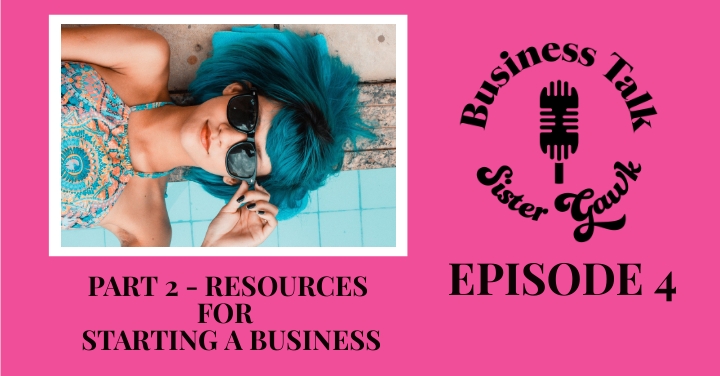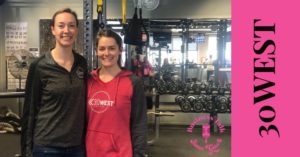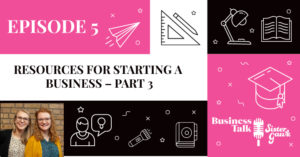In this episode, we talk about all the tools to prepare you for starting your business. We discuss different educational content that is available to you for free, and we dig into some very cool research tools that you can use while trying to understand your potential customers. If you hear about a tool that you like, we have all the links to these different websites on our Tools & Tips page of our website!
Disclaimer: We have NOT gotten paid to talk about any of the tools mentioned in this episode.
Bekkah: Today we’re going to be talking about free education options available to you. The first thing we’re going to be talking about today is lynda.com. Ruthie and I really like this resource because it has specific educational programs with a variety of topics that you can learn different skills about. It’s really nice if you have a little bit of time to learn a new skill. Maybe you’re on the road a lot and you want to watch some videos and learn different things. That’s a great place to do that! (If you’re not the one driving of course.) My favorite part about this platform is that you will receive a certificate at the end of completing a training that automatically links in with your LinkedIn profile. Lynda.com is actually owned by LinkedIn so you can be confident of it’s seamless integration. Ruthie has some cool things she likes about it, too, but I’m gonna let her share.
Ruthie: Yeah, it’s also called “LinkedIn Learning” on some platforms, but what I like about it is that you can make your own playlists based off the lessons that they have available in the classes. I have my SEO playlist, I have a whole playlist about Google Sheets, and others like that. It’s great for just learning and sharpening my skills, and just getting more information about
things that I’m already doing for my business and how I can make them more efficient on a day-to-day basis.
Bekkah: We forgot to mention the best part about lynda.com. If you have a local library subscription or sometimes even through your university or school system, you actually might have a free subscription to this that you might not have even known about.
Ruthie: It’s definitely worth asking about.
Bekkah: If your local library doesn’t offer subscriptions, like our local library, you may still be able to get one through the interlibrary loan systems and services. You can actually get a library card for a different county in a different area using your local one. So we actually did that for a metropolitan area and said, “Hey this is our library card, can we have one of yours through this?” and they gave us one for free. That allowed us to access all of their online resources. Since that county actually has a contract with, or a subscription for their users to go into lynda.com, we just have to log in through the library’s website for their free online resources. So definitely check that out!
Free Community Resources to Help You Build Your Business Better
Bekkah: A couple other ones that you should check out within the free education aspect
are Hoopla and Overdrive. These are two resources that a lot of libraries utilize because they don’t want to build their own digital resource, since that would be crazy expensive. Ruthie tell me a little bit about what your experience has been with these two resources – if you’ve had any – and I’ll tell you about mine, too.
Ruthie: I read one time that “the average millionaire reads one non-fiction book a month.” I am not a big reader, but I love audiobooks so I can be doing things while getting book content. Hoopla is my favorite because it has a really easy user interface and it’s very quick and easy to use. You can download books and it doesn’t take up a lot of space on your phone. I like that a lot so I listen to a lot of audio books and they have a really extensive library on the app. Tell us a little bit about Overdrive, Bekkah.
Bekkah: Yeah, so Overdrive is kind of like the clunky cousin of Hoopla I really like overdrive because it has a lot of classics. I just listened to “To Kill a Mockingbird” and what – priceless book, by the way, I don’t know if you read it in 9th grade but –
Ruthie: I did read it in 9th grade.
Bekkah: Reading it again or listening to it was really beneficial to me. I was able to say, “Whoa this is quality advice.” I really like both of those. If you can get one or both of those for free within your library, do it! One thing I have recently learned about some library systems that have subscriptions to Hoopla, is that they have a set limit of how many checkouts their entire library system can have and it resets at midnight. So sometimes I will wait till midnight and then I’ll go in and I check out a book. Either that or I’ll go in really early in the morning before everyone else checks out their movies. Also, Because it’s through the library you don’t have unlimited access. You may have a limit of something like five downloads a month.
Ruthie: Yeah that’s Hoopla’s limit.
Bekkah: Yeah, so, think about that as when you’re choosing a book. Don’t just pick everything at the same time, but you can definitely put it in your favorites and then when you have time check those out.
Ruthie: And it gives you a deadline for when the book will be returned back to the library. That’s kind of a good incentive to listen to the book. They also have e-books and stuff, too, so yeah. It’s like a little accountability check.
Bekkah: Yeah, and the nice thing about the app is that you don’t have to actually go into the library to drop it off. It just takes it out of your digital files
Bekkah: So easy.
Ruthie: The next resource that we are going to talk about is Spotify. Hopefully this is one that you’re familiar with. If you’re not familiar with it, then Google it because it is well worth your time. Not only is it a platform for music – a wide variety of music to be sure. It’s definitely probably one of the largest libraries of music in the world, – they also have countless podcasts that are just really, really excellent. I listen to a lot of them. You can save them, heart them, and then share them with others. It’s really easy.
Bekkah: Yeah so here’s the downside of the business aspect – if you’re going there to learn specifically about business – a lot of people have podcasts on business that are basically selling you their creative knowledge, consulting, or a weird product that they made. And there’s only like five nuggets of useful information in a half hour. So one of the things that I would recommend when listening to podcasts is that if you’re not learning something relevant to you or a business in general, every two minutes at least, then move on!
I say that because it’s really not going to get any better. And there’s a ton of business podcasts out there and most of them are, personally, I feel a waste of my time to listen to. So definitely take that into consideration. We can’t give you a link to your local library because, reality check, you’re going to have to walk there. Either that or drive right? And spoiler, if you haven’t been there there’s a lot of books.
Ruthie: You should go, because not only do they have… I think one thing that’s really important about the library is, not only do they have written resources that you can utilize – different books and things like that – but they’re also an incredible resource to the community. Also librarians are just really smart – I’d never realized how much education you had to have to be a librarian.
Bekkah: You have to have a master’s degree to be a librarian! It’s ridiculous! I mean I personally think they might have a class specifically in shushing. I’m not sure, but…
Ruthie: Shushery.
Bekkah: Up for debate. “Shushery 101.” So anyway, basically what we really like about the local library is that if you can connect with the resource librarian they will often actually have connections and access to statewide systems. The statewide systems website is completely different from local, but what’s nice about it is that you can actually get books from college libraries sent directly to your local library to pick up. So if you’re looking for something specific to a very niche research area, there are a ton of resources actually available that you probably couldn’t find on your own. And on top of that, you don’t have to buy the book, like wow!
Ruthie: And networking is just really important. If you’re talking with your librarians, chances are they talk to a lot of people in the community. So if your business needs a community then it’s really good to have that network with your library. That way they can tell people about your business.
Bekkah: Yeah but they’re not going to let you sell stuff there so don’t try it. Okay!
Bekkah: A local workforce center! We really like them because they also get paid by the government to help you for free. If you’re looking for a job or need career counseling they’re a really good resource for this. I know there’s plenty of life coaches out there that can help you explore things – most of them make a lot of money because some people don’t have moms that do that for free – but think about talking to the career force people. They have a lot of resources, like personality tests and career aptitude tests, that you can actually take for free through their location.
When you first go there you might realize that they may not always be super enthusiastic and they might say, “Check out our website,” and if you’ve already been to their website you can say, “I already did and that’s why I’m here!” Know specific questions that you want to ask like, “I am looking for personality tests so I can figure out what I want to do with my life.”
Ruthie: And that will be a better use of your time for both of you, for the person that you’re talking to and for yourself. Then you can get in and find the information that you’re looking for, because you already know what you’re looking for. Then do what you need to do with the rest of the day!
Bekkah: Yeah and if you’re looking for a job – bring your resume in have it ready to go and say, “These are what my skills are. What do you guys know is available?” Many times they actually know a lot more business owners that are looking for someone
than are listed with an actual opening, and they’ll keep you in mind for the future. That way, if they do find someone that’s looking for something specific they can say, “I know just the person!”
Ruthie: And I have their resume!
Free Educational Options To Build Your Resume & Experience
Bekkah: Hot dog! Right? Okay so another place we love is “MIT Free Coursework“! You should look at this link on our website! This is a gem that one of my friends who’s currently pursuing master’s degree in economics sent me. She loves this. She actually did a micro degree program through MIT. MIT has a lot of their lectures listed online for fee; you can learn so much about so many different topics. Definitely check that out because it’s basically like getting college education without having to pay the price to learn some really cool stuff. Spoiler though, some of it is really hard because these people are really smart. For example, if you’re taking like a stats class and you listen to those lectures, you might be a little bit lost if you don’t have any pre-training on statistics.
“Udacity” is another one that I personally really like! You can learn how to code python, C++, or CSS. There’s so many different things you can learn from them! They have a lot of free courses. They have a lot of paid courses as well, but they have a ton of functionality for you to test out your skills within the digital world. If you want to learn any coding – this is a place to do that. Their homework segments are intense but they’re good because they push you to test out your knowledge. I have taken a class through them before and I’ve been very thoroughly impressed by my ability to do a lot of this learning on my own, but also to apply what they’re teaching.
Ruthie: And basically anytime that you have an opportunity to learn more about the online world of marketing you really should do that. It will benefit not only your website, but it can help you with helping other people as well. I know that that
is definitely a skill that is lacking in the workforce today, especially for small business owners. You might ask them about their website and a lot of times they say something like, “Well someone made it for us but I have no idea how to log in, so our hours have been wrong for two years.” So, you see, it’s just it’s really valuable to be able to learn even just the basics of how your
website works, how to code, and things like that.
Bekkah: With that though, I would just be a little bit careful with how much you want to flaunt that. Especially in a job interview, because…
Ruthie: If you have a basic understanding of how to code and you say, “I know how to code!” then they’re probably going to expect you to KNOW how to code, like be really good.
Bekkah: Yes, but also, too, you could get stuck doing it even if you don’t like it. If you don’t particularly like coding, then don’t say that you know how to do it, because you can get stuck doing a whole lot of stuff you don’t enjoy. But regardless, Udacity is a really good place to test out those skills or learn different things about different areas of coding since they have so many resources in there. It could even be a good place to test out if it’s even something you want to do in your life.
Free Research Tools to Help Your Business
Bekkah: The next category of things we’re going to talk about is “Free Research Tools”! You guys! You have no idea what is actually available on the internet. “Moz Keyword Explorer” is a tool that Ruthie and I really like for Search Engine Optimization. If you’re looking into building a website and you want to know, “Hey, who are my competitors?, What are they using for keywords?, and What are they doing for their customers?” This tool allows you to actually creep on other people’s websites by plugging in the URL and seeing what kinds of keywords they’re ranking for. This should be able to give you similar things that you should be looking at in the future to expand your business. The tool can help you answer questions like, “What are people seeing as a difficulty?” and “are there a lot of people ranking for that? How difficult is it to put that in your website and show up and be found on google?”
Ruthie: Basically, it just tells you what keywords users are searching for to get them to your competitor’s website.
Bekkah: Yeah, you can also search specifically for keywords that you want to know the monthly search volume of. With Moz – it’s free to use if you create an account – I think you get about 10 searches a month, so use them wisely if you’re really serious about beating the competition. I mean, obviously, you can use a paid account, too, but I mean we’re cheap so…Okay!
Bekkah: “Answer the Public” is the next SEO tool that I really like especially if you’re wondering what questions people are asking about a specific service or product. When you type a keyword into the search bar it’ll give you this really cool, weird, spiderweb graph of all these questions associated with the word that you put in. It’s really awesome because you can figure out what what people actually want to know! This is a really great tool for writing your frequently asked questions page, writing blogs, doing Facebook lives, answering questions for your customers, and understanding how they think about what you offer. So it’s a really great site to check out.
Ruthie: And the free version of that, when you type in say like, we’ll say “plumbing,” I don’t know. So when you type in plumbing it’ll like create a whole bunch of questions about plumbing that people are actually typing into google and and other search engines. The free version pulls search queries from England, so you man want the paid version that actually pulls information from America but it’s not always necessary. I’ve had the paid version before and the results are usually pretty similar.
Bekkah: People are People. You should try to be kind of specific about what you’re searching though, because if you just put in “plumbing” you’re going to get results like “how much does plumbing cost?” That tends to be too broad, you know?
Ruthie: Try to be specific.
Bekkah: Yeah, so that’s something to think about. The next tool I really like for creeping on websites is “hunter.io.” In the free version of this, I think you can get 50 searches. A fun feature of this tool is that if you take a domain name and plug it in, it’ll give you every email address on the web associated with that domain name. So for example [email protected] that’s our email handle. If you would search our website in hunter.io it would show up with the two emails associated with our website, right?
Ruthie: And what’s nice about that is, say that you are trying to connect with a business that’s really big or something like that and you want to know all the people who have the the domain name of let’s say – I don’t know – Aldi or something like that, then you would search that and it would show you all the emails. You can get people’s emails address who are CEOs and things like that. It just gives you a whole list of email addresses to the people that belong to that website domain name.
Bekkah: Yeah but from personal experience with Aldi, they’re still on, like, the 90’s processing system. They still get faxes so, I don’t think you could probably find any emails for them.
Ruthie: Maybe Best Buy.
Bekkah: Okay yeah. So anyway, with that I do want to make a caveat of what you’re searching. If you use those email addresses to contact people you need to be very, very will versed on what is legal and what is illegal to contact them about.
Ruthie: And it is worth researching that topic to know what’s legal and what’s not.
Bekkah: Search unsolicited email lawsuits and you’re going to figure out, “Oh, yeah, like I totally added all these people to a campaign and they did not subscribe.” I think it’s like the offense is around 50 dollars a person or something like that, so it’s a pretty serious thing.
Ruthie: And a lot of those laws came about because of the GDPR, which is the General Data Protection Regulation. If you’re interested in that you should Google it and try to learn more about what the GDPR is.
Bekkah: Yeah, thank you European Union, we now have that in the United States.
Bekkah: Okay so the next thing we’re going to talk about is “Google Trends” we like this, because you can put a keyword in and it shows you the search volume with major spikes. This is a really great tool for finding cyclical patterns, especially, if you’re going to be selling a product. You can actually see when the most common time for people to search for your product on the internet. For example, the one that I put in there was “tie tac.” It turns out that there’s a huge spike in this search term cyclically, if you look at the five year pattern between November and December. I would assume this is because people are trying to look nice for the holidays. It doesn’t tell you why pattern exist but you can make those assumptions based on what the patterns look like. So ultimately this is a really cool place to figure out: what’s the right term to use, if people are looking for that, and when you should be selling something. Strike while the iron is hot, Right?
Understanding The Target Market of Your Business
Bekkah: Okay so let’s talk about the U.S. Census Bureau. This is completely underutilized! I think it’s a really good place to build information about a target market. If you were going to start a physical location, say you’re going to start a boutique or even a small little business within your house, and you’re going to sell locally, then you really need to know who your market of people who are going to be interested in this is. What is the size of the people group that you’re looking to hit? Where do they live? You can look at Census Bureau information to see what’s the average income of your city or county, how many children people have on average, where they live, and what housing costs look like. All of that information is really important for knowing what is your price point needs to be for selling your products since you have to be able to price it for what people can afford. Either that or get into a really a tight niche so you can put a lot of hype into your brand to make it desirable and more expensive. Right?
Industry Specific Research Tools
Bekkah: “Exploding Topics” is another place we really like. We’re going to really try to wrap this up for you. We like this because it shows you new fads on the rise, keywords that are happening in the world, what people are concerned about, and new products coming out. “Jungle Scout” is the last one that we like. If you are ever on Amazon and you see what’s going for sale on Amazon, with Jungle Scout you can actually see the number of movement. You can find the sales category number and product ranking number. When you have, you can plug it into this Jungle Scout estimator and it tells you approximately how many units of that product are moving monthly. So that can be a good decision maker whether you should invest in a product if you ever want to sell on Amazon.
Bekkah: Thanks for joining us! We’ll see you next week.
We hope that you enjoyed this episode of Business Talk Sister Gawk and that you find the tips and tools useful for future use! Thank you for listening and remember that you can find all the information mentioned here in our Tools & Tips page. Remember, if you enjoyed this episode, and/or found the information helpful, share with a friend! This is the best way to help our show.
Until next time,
Bekkah & Ruthie




